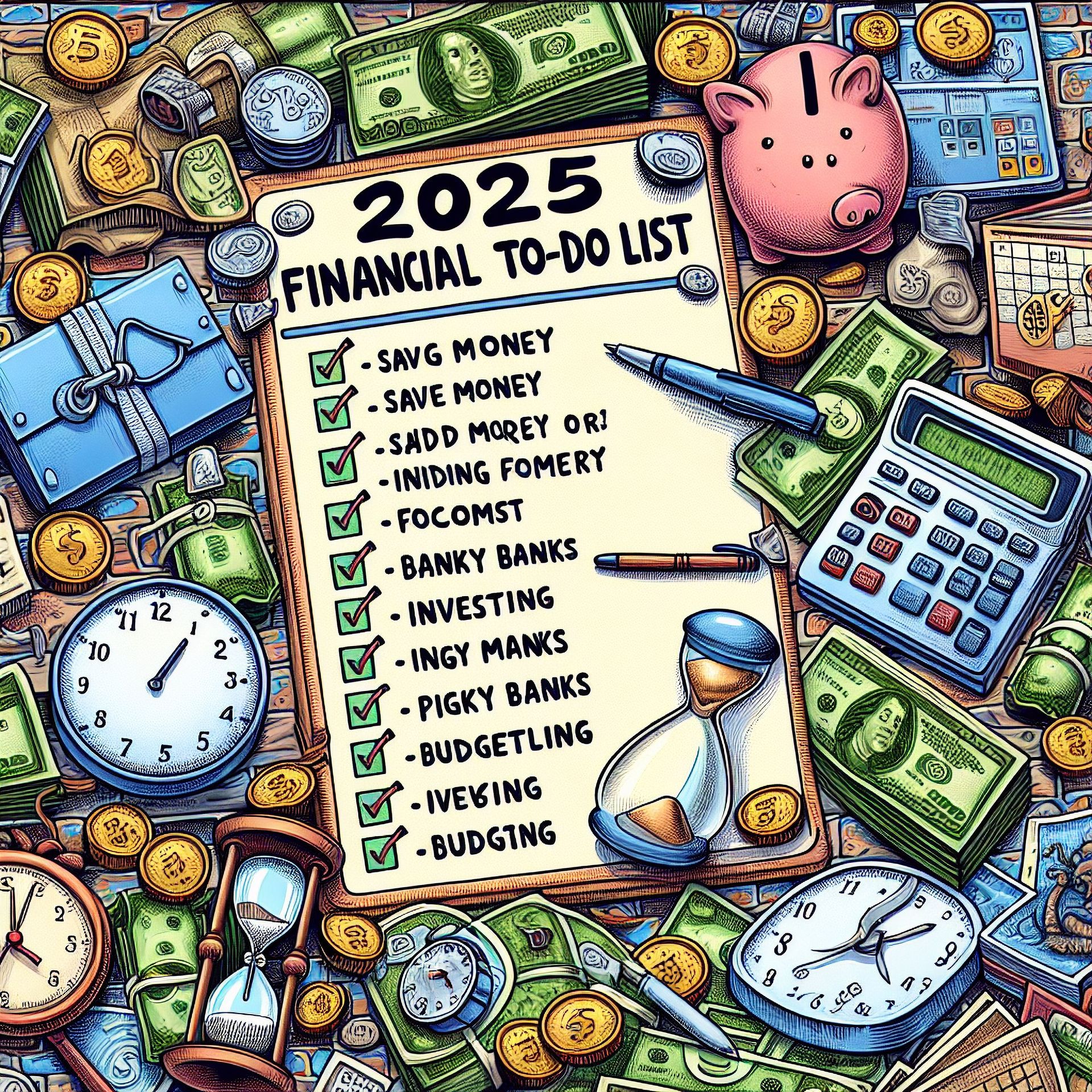Ten Things to Tick Off Your Financial To-Do List in 2025
Andy Wood • January 14, 2025
Ten Things to Tick Off Your Financial To-Do List in 2025

Introduction
Contact Us
With the new year upon us, it’s time to set your financial house in order. The Autumn Budget 2024 introduced several tax changes that will come into effect this April, impacting a wide range of financial areas, from capital gains tax to non-dom rules. By proactively addressing these updates, you can optimise your financial position and safeguard your wealth. Whether you’re focused on tax planning, saving, or investment strategies, these ten tasks will ensure you’re on the right path.
1. Revisit and Revise Your Budget
The cost-of-living crisis continues to affect households across the UK, with inflation driving up the prices of essentials such as energy, food, and fuel. Revising your budget for 2025 is crucial. Take advantage of personal finance apps like YNAB
or Emma
to track spending, adjust to rising costs, and identify potential savings. Effective budgeting ensures you have a well thought out and clear plan for managing your finances throughout the year.
2. Maximise Your ISA Contributions
For the 2025/26 tax year, the annual ISA allowance remains at £20,000. This presents an excellent opportunity to shield your savings and investments from tax. Explore stocks and shares ISAs for growth potential or diversify into innovative Finance ISAs for tax-efficient returns. Planning early in the tax year allows you to take full advantage of these opportunities and make the most of compounding benefits.
3. Prepare for the April 2025 Tax Changes
From 6 April 2025, key updates from the UK tax system will take effect, including increased capital gains tax rates for higher earners and revised non-dom rules. Working with our tax adviser
is essential to navigate the changes that may be faced by non-UK residents and expats.
Whether you’re claiming reliefs, selling property, or reviewing offshore income, advance planning will save you time and money.
4. Consolidate Your Pension Pots
For those with multiple pension schemes, consolidating into a single platform can simplify retirement planning and reduce fees. Providers like PensionBee
make the process straightforward. However, it’s important to assess exit fees, tax implications, and the value of guaranteed benefits before consolidating. With changes to the lifetime allowance rules, 2025 is an opportune year to review your pension strategy.
5. Reassess Your Investment Portfolio
Market volatility and global economic uncertainty make 2025 an essential year to rebalance your portfolio. Review your asset allocation to ensure it aligns with your financial goals and risk tolerance. Exposure to global equities, green bonds, or alternative assets such as private equity or infrastructure may offer resilience and diversification. If you’re unsure where to start, seek advice from our investment advisers
who have experience in handling the ever changing market trends.
6. Set Defined Savings Goals
Establishing clear and actionable savings objectives is critical for both short-term and long-term financial success. Whether you’re building a house deposit, an emergency fund, or contributing to your retirement savings, automation is your ally. Setting up regular transfers into high-interest savings accounts or ISAs can keep you on track. Keep your goals specific and realistic, and review progress quarterly.
7. Protect Your Estate from Inheritance Tax (IHT)
The government’s recent announcements on inheritance tax changes make 2025 an important year for estate planning. Use strategies such as lifetime gifting, trusts, and IHT reliefs to minimise exposure and protect generational wealth. Seek guidance from our financial planners
to ensure your will, powers of attorney, and beneficiary designations reflect your wishes and take full advantage of the latest tax breaks.
8. Monitor Your Credit Score
A strong credit score is indispensable for securing favourable mortgage or loan rates. Services like Experian, ClearScore, or Credit Karma
provide free and regular credit checks, helping you identify errors or fraudulent activity. In 2025, focus on reducing debts, staying below credit utilisation thresholds, and making timely payments to bolster your score.
9. Review Insurance Policies
Life circumstances change, and so should your insurance coverage. Take time to review your life insurance, health policies, and home insurance to ensure they adequately reflect your current needs. Rising living costs mean rebuilding costs for homes have increased, so ensure your property insurance covers the true value of replacement.
10. Engage With Our Professional Financial Advisers
It can be difficult to understand UK tax law, budgeting, and investment opportunities. Our financial advisers
can give you tailored guidance, so that you can seize opportunities in areas like tax-efficient investments, estate planning, and retirement savings.
Final thoughts
Financial planning in the UK needs vigilance, adaptability, and a proactive approach. The key is preparation. Revisit your budget, adjust for upcoming tax changes, and seek professional advice.
Get in touch if you have any queries about this article or to speak to an experienced advisor.

By Andy Wood
•
April 1, 2025
For over two centuries, the UK’s non-domiciled tax regime and its remittance basis has been a cornerstone of tax planning for wealthy expats and international families. It was introduced, along with income tax, by Willian Pitt the Younger at the very end of the 18th century. It was part of the fiscal firepower necessary to battle Napoleon Bonaparte. And, like income tax, it had pretty much been a constant feature of the UK’s system ever since. But in March 2024, the then Chancellor, Jeremy Hunt, rang the death knell for the remittance basis, with Labour’s Rachel Reeves – who would succeed Hunt a few months later - declaring she would have abolished it anyway. The end is therefore very much nigh for the UK’s non-dom tax regime. More specifically, the end is 6 April 2025. However, out with the old and in with the new’ goes the saying. As such, the ‘what comes next’ will reshape the tax landscape for non-doms, expats, and international investors with a UK footprint (or those considering creating one). What is Domicile (and Non-Domicile)? Domicile is not a straightforward concept like tax residence. The latter is largely about physical presence (or otherwise) in a particular. Instead, as well as physical presence, it also requires an understanding of your future intentions. Is a place somewhere that you intend to live permanently or indefinitely. There are two main types of domicile that I will discuss here: • Domicile of origin: This is inherited at birth, usually from your father (if you think that is misogynistic then I don’t make the rules, OK?). You do not lose your domicile of origin. However, think of it as the foundations of a building. You can a domicile of choice on top it. • Domicile of choice: You build a new domicile of choice by achieving two things. Firstly, by physically residing in place and, secondly, by forming the intention to stay in that same place permanently or indefinitely. Both must be present.

By Andy Wood
•
March 26, 2025
So you’ve left the UK for pastures new. The sun is shining. You're making more money. You’re enjoying a great quality of life in a new country. In fact, you’re totally de-mob happy. Even better, as a non-UK resident, UK taxes are a dim and distant unpleasant memory, right. Right? Wrong. I don’t necessarily see my role in life as chief balloon popper. However, there are some Uk tax things you should bear in mind before declaring yourself a tax exile. Am I really non-UK Resident (“NR”)? Up until 2013, the UK didn’t really have a statutory definition of residence for tax purposes. Yes, that’s as crazy as it sounds. Fortunately, the Statutory Residence Test (“SRT”) was introduced from 2013. The idea is that it provides a degree of objectivity through a series of tests. Although a statutory test, other than in straightforward cases, it can still remain complex.

Mosaic Chambers Group is a trading style of Mosaic Chambers FZ LLC
BUSINESS CENTER 05,
RAKEZ BUSINESS ZONE FZ
Email us
info@mosaicchambers.com
© 2025
All Rights Reserved | Mosaic Chambers Group LLC | Privacy Policy